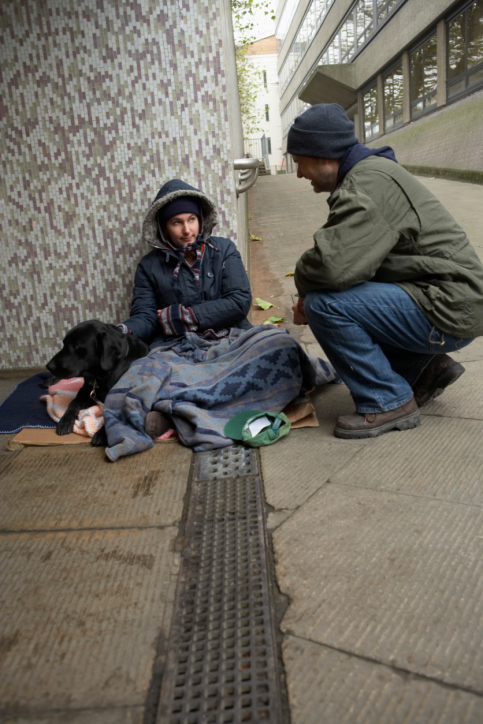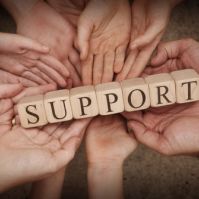 For many modern urban residents, homeless people are an unavoidable, if somewhat troubling, fact of life. Whether holding a cardboard sign proclaiming their situation at the edge of a parking lot or occupying downtown parks or libraries, the unfortunate individuals who have fallen down along the fringes of society tend to be out of sight and out of mind for most people. Some churches try to accommodate and assist those who are struggling with material existence due to mental illness, addiction, or even just harsh circumstances or bad choices in life. Other groups seem to want to wash them away like the debris that is typically left behind where homeless individuals have sought shelter.
For many modern urban residents, homeless people are an unavoidable, if somewhat troubling, fact of life. Whether holding a cardboard sign proclaiming their situation at the edge of a parking lot or occupying downtown parks or libraries, the unfortunate individuals who have fallen down along the fringes of society tend to be out of sight and out of mind for most people. Some churches try to accommodate and assist those who are struggling with material existence due to mental illness, addiction, or even just harsh circumstances or bad choices in life. Other groups seem to want to wash them away like the debris that is typically left behind where homeless individuals have sought shelter.
Washing the Alcoves
At St. Mary's Cathedral in San Francisco, sprinkler systems that had gone on at regular intervals throughout the night in the alcoves have been dismantled after public outcry. Homeless people frequently sheltered in the entrance areas to the building at night, and leaders of the diocese began to be concerned about the safety and cleanliness of the area.
About two years ago, at the height of one of the worst droughts in state history, the alcoves on the exterior of the cathedral were outfitted with sprinkler systems. Church leaders had learned that buildings in the city's financial district had begun using similar systems to clean the areas around the buildings where homeless people had gathered. Reports of dangerous debris left behind included troubling concerns such as:
- Needles
- Glass bottles
- Drug paraphernalia
- Soiled clothing and blankets
- Human waste, including feces
Safety concerns were a large part of the motivation that led church leaders to install the automatic sprinklers in the alcoves and doorways of St. Mary's.
Outcry
Set to go on every half hour for about a minute and a half, the sprinklers drenched homeless individuals who had come to the alcoves for shelter with their belongings. Many of the struggling people who had sought shelter there responded to the water with attempts to stay dry in the form of waterproof clothes and tents or other coverings for their goods. The man-made rain was relentless and regular, though.
Shining the Light of Publicity
Media coverage soon focused on the church's inhospitable exterior, and the church recently backed down. It was explained that the sprinklers were an ill-guided attempt to redirect homeless individuals from sleeping in the alcoves around the cathedral to other areas of the property that were thought to be safer for them to occupy. The diocese removed the watering system.
Misunderstood Intentions
The rector of the cathedral, Auxiliary Bishop William Justice, said they were "sorry that our intentions have been misunderstood," and that they "recognize that the method used was ill-conceived." He noted that the attempt had been to increase safety, as "the problem was particularly dangerous because students and elderly people regularly pass these locations on their way to school and Mass every day."
Dehumanizing: Part of the Problem?
Homeless advocates praised the decision to remove the sprinklers, but noted that the effort by the church to wash away the challenging problem displays a dehumanizing attitude toward downtrodden members of society that, sadly, seems to be prevalent in America. "Water is a very effective tool to get someone to move, and it's become a tool in addressing homeless in America today. It's pretty sad," said a director of the Western Regional Advocacy Project, a group that works to serve homeless individuals.
True Religion
While churches have legitimate concern for the safety and enjoyment of their members who come to their buildings to worship and learn, they have a duty to their community as well. Religious leaders have traditionally recognized the truth: communities are stronger when they are open to all members, even those who are on the fringes and may seem different. Whatever the reasons are that drive people to the streets, the truth is that they are human beings and they deserve a level of respect from others who are more materially blessed. A society that operates from a place of inclusion, acceptance and openness to all is stronger because more of its members are able to find the resources they need to thrive.



